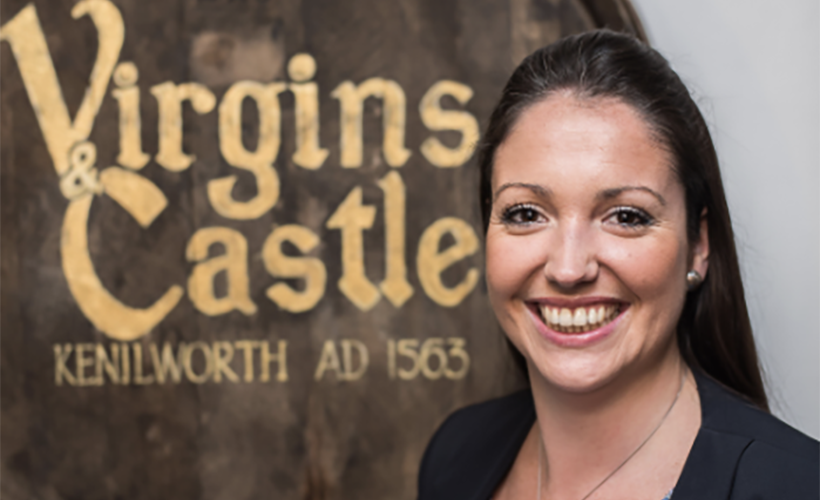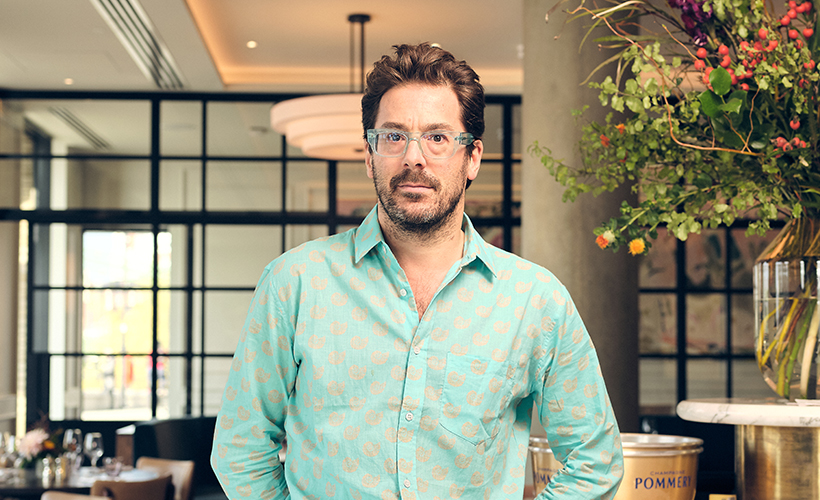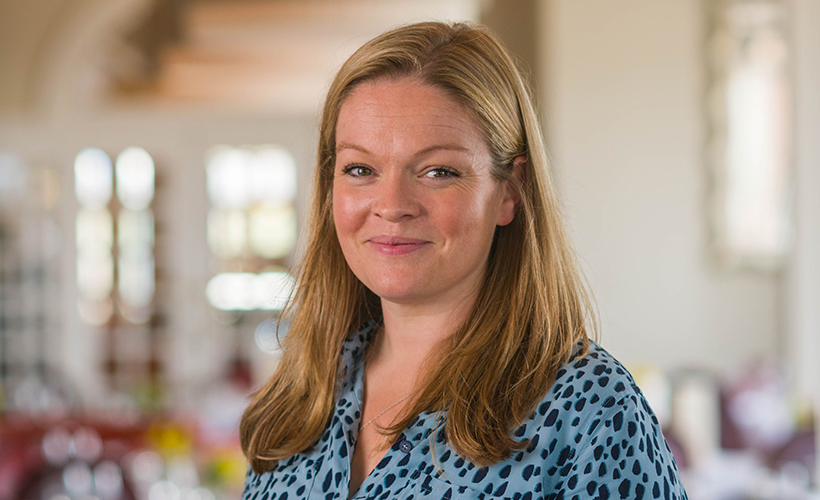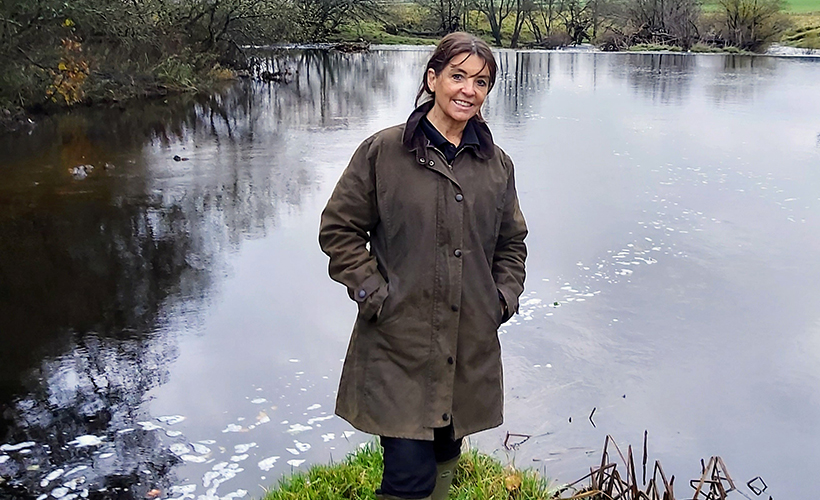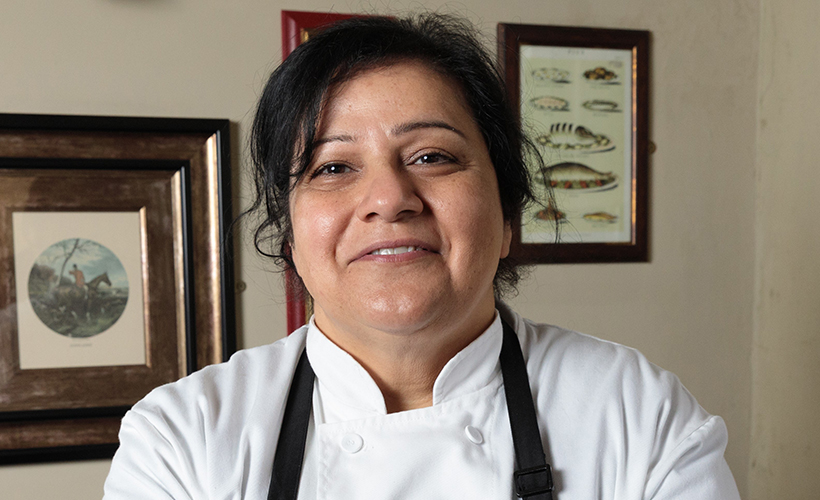In the second instalment of our fortnightly diaries series, we hear more from our six operators on how they are coping with hospitality's challenges, from the heatwave bringing a rise in staycations to the difficulties of creating a menu with limited supply and the boom in post-lockdown weddings
Julie Crump, chief operating officer, Caviar & Chips
We're well and truly into wedding season now. We have seven weddings this week (six of them on Saturday). The big challenge for us at the moment is that our clients book us up to two years in advance for their big day, and right now we're delivering weddings that we quoted in 2020 or even 2019, due to Covid delays, and the prices are now completely out of date – just look at the cost of butter, it's sky-rocketed.
Food prices have had such a big impact, but it's labour costs and energy too. I'd say the cost of delivering a wedding today, compared to the quotes from 2019, has increased by at least 50%.
We're honouring those prices because we feel it's the right thing to do. Where there has been a significant increase, such as certain cuts of meat, we've either slightly increased the price or worked with the couple to adjust their menu. So perhaps instead of a fillet of beef they would have rump. We don't want to let our couples down – it's the biggest meal of their life and they have so much to think about, so it doesn't matter what the cost is, we've made a commitment.
We're lucky, because over the past few years our business has grown, we've won many awards and developed a great reputation. This has resulted in a surge in demand for our services and we're now able to reflect this in our future pricing. Having the experience behind us and the badge of ‘best wedding caterer in the UK' [by the Wedding Industry Awards] puts us as a premium caterer, and this is quite different to just a couple of years ago when we were building our business and credibility.
We also work with a wide variety of suppliers and local businesses, so we always manage to source ingredients for the menus, rather than being tied to a big national chain which may suddenly say it can't source what we need.
The other thing we've been doing recently is putting in plans that will help us in the longer term. We're opening our own boutique wedding venue, Stockton House, in the next week, and we've been investing in things like a woodchip heating system so we don't have to use oil, and we're working with the local estate to offer locally-grown produce.
At the end of the day, the couples choose us because food and drink is important to them and they know it costs money. We've had some couples come to us because their original wedding caterer has gone out of business, so we feel really lucky that we're still here, but it's definitely still tough.
Sam Harrison, founder, Sam's Riverside, Hammersmith, London
We've been crazy busy for the past couple of weeks. West London usually empties out in August, but we've done some great numbers. Our location by the river helps, but we've just had one of our best weekends ever, which I would not have predicted. I was doing the door on both nights and it was absolutely hopping, in a good way. However, we'd cut the rota back a bit, so it caught us out. The staff are doing great, but probably doing a few too many hours, and we're still not getting a lot of CVs, particularly for chefs.
There also seems to be a bit of poaching going on, with some very nice signing-on bonuses. One of my junior managers has gone for a £2,000 signing-on bonus. It's a slippery slope. I have the honest conversation and say the grass isn't always greener, but for many it's hard to resist that kind of money. It will take care of their energy bill!
Pricing is still a worry. We're doing a deep-dive price review every Monday, as most of our suppliers change their prices every week. You have to be on top of it and adapt quickly. We're looking at the mix of dishes and making sure we're not selling too many of our loss leaders. There are dishes that we only make a cash margin on so we need to interrogate the balance of pricing against volume of sales weekly. We've taken whole Dover sole off the menu as the price is so high for a decent-size sole that for what I'd have to charge – around £60 – I don't think I'd sell enough. So we're now offering a Dover sole fillet – it's less fish but it's a complete dish with potatoes, vegetables and a sauce. We can charge less for the dish and I will sell more. I've taken whole lobster off too, because the price of natives is so high, though we do have it in our lobster and crab roll. That said, we don‘t lose money on it, but we don't make a great deal as I can't charge as much as I should. All this takes up more admin time for hard-pressed senior chefs, who should be in the kitchen cooking but are spending their time costing a Dover sole dish.
James Ratcliffe, co-owner, the Black Bull, Cumbria
We have quite a few events in August, so it's been really busy. We had a big cricket match in Sedbergh last week with Lancashire Cricket Club. All the coaches were staying over, so 15 out of the 18 rooms were booked up, which was great. The only problem was providing breakfast for everyone at the same time, because we usually stagger service when we can. Sedbergh school will also be hosting a camp for students from Australia or Hong Kong later in the summer, so we're excited to welcome them. Hopefully they won't all be asking for breakfast at 8am.
Bigger causes for concern are around the number of weddings taking place in the local area, which limit our customer base. We don't hold weddings ourselves, but recently we've noticed a lot of wedding guests staying with us. The influx of people is good news, but we miss out because people don't eat with us. If we have 18 rooms booked in, that's at least 36 covers lost in the restaurant, which is tricky.
The outside space hasn't been that busy either – maybe it's because of the weather. We staffed up expecting alfresco dining to be popular, even with the price hikes, but it's not like last year. We need demand to match the investment we've made. You have to be really on the ball and react to costs going up, but there's only a certain amount that people would be willing to pay extra. We've already had to put the room rate up, because a portion of that feeds into breakfast. We've also introduced a service charge to help with staff costs.
Thankfully, we're doing OK with staffing at the moment, but the four-day week is something we need to consider, which wasn't a thing when we started in the industry. We've just had a new person join the team – an apprentice – so we're hoping to encourage more of that. Over the past six months we've been sending flyers to local schools to incentivise the next generation of students to join the hospitality industry. Some schools might think otherwise, but chefs are really in demand at the moment. Our sous chef is 21 and works a four-day week, earning a decent salary. We want young people to know that there is genuinely a career in hospitality.
Veryan Palmer, director, Headland hotel, Newquay
It's Boardmasters music and surf festival this week in Newquay, so 50,000 people are arriving and it's the most epic weather imaginable for them, which is amazing.
We have a lot of parents, as well as some of the acts, staying with us. While their kids go to the festival the parents come and have a lovely relaxing time. We're set in 11 acres above Fistral beach, so we're an oasis of calm overlooking the skate ramp and surf festival.
In the last couple of weeks we've seen that a lot of people have clearly given up all hope of going abroad which, combined with the good weather, has had a big impact on people deciding to come to Cornwall. It's not as busy as the last two summers though, which is actually a good thing – it was quite unsustainable last summer.
I have updates on the energy situation. We're coming out of a three-year contract and our projected costs show that our electricity bill will go up by 290%, which is an increase of £1,300 per day. Our gas has gone up 515%, which has increased costs by £1,100 a day. Gas and electricity used to cost us £344,000 a year and it will go up to £1.2m. For a company with turnover of around £13m, that's a mind-boggling increase.
The swimming pool building we finished in July 2020 has combined heating and power system and is incredibly energy efficient, which we are so thankful for. If it had been a 10-year-old building we'd be in a world of trouble. The hotel itself is an incredibly old building and we can't have fancy double-glazed windows, so we will need to look to heat only one side of the hotel if we're at lower occupancy and keep curtains closed in the rooms to try and be as energy efficient as we can.
It's been amazing to see what the team have been suggesting. We were doing a lot, but people are being much more creative. Our reservations team has put everything in their office on a timer, so half an hour after the last person finishes their shift the whole office goes black until half an hour before the first person arrives the next morning.
We know our business in the autumn is strong and we're hoping that continues, which it's looking as if it will. We'll have The Witches afternoon tea, and The Witches stay [the adaptation of Roald Dhal's classic was largely filmed at the hotel] and we have an exciting potential collaboration so hopefully we can offer staff more hours in the autumn when domestic fuel bills also increase. We've got to do as much as we can to support the team through this.
We're also looking forward to welcoming our new general manager, Adrian Pickard, next week.
Debrah Dhugga, chief operating officer, the Apartment Group
Since opening Runa Farm in County Durham at the end of July, we've been working on the complete revamp of the farmhouse on the site – a six-bedroom exclusive-use venue. It's a stunning farmhouse with a private hot tub and beautiful views.
We've also opened the Smithy, an 80-cover, all-day restaurant with a small café at the front for afternoon teas, for those day-trip farm visitors.
We've appointed a new group executive chef, who starts with us in the next eight weeks, and we have continued to recruit staff for this new opening and others. Training is ongoing across the group.
One challenge we could do without is the continued delays in furniture and soft interiors for our new spaces (like the farmhouse). There are long delays on bespoke items we have ordered from Europe.
On the plus side, our Runa Farm wedding open day was a huge success with hundreds of visitors. We were delighted with the response and had lots of interest in future celebrations.
Stosie Madi, chef and co-owner, the Parkers Arms, Newton-in-Bowland, Lancashire
It's getting very difficult to get produce during the hot weather. This time of year, we start foraging for mushrooms, but we're finding it difficult as the ground is so dry and the rivers are low. Normally the bushes are groaning with blackberries and raspberries that we harvest to keep over the winter months. Although berries are growing, they burst into ripeness quickly so they are not sweet, and then they shrivel up quickly as there's no water. We like to cut our costs this time of year by foraging, but our raspberry crop is down substantially.
Oysters are back in demand in the restaurants after a weekend of no one buying them, which seemed to be a freak occurrence. I'm looking forward to game season, which kicked off on 12 August, because it means we buy less beef, pork, lamb and mutton and game is relatively cheaper but adds something vibrant to our menu.
We've been experimenting with using milk to make our own butter for cooking, but we just didn't create enough and it takes too much time, although it is much cheaper. I got in touch with a local farmer who might be able to sell butterto us in big chunks that's not cut up or packaged, so it's a better price.
I am worried about what's going to happen when the energy costs shoot up again in the autumn and winter, although we are luckily on a fixed contract, but the price of coal and wood have almost doubled. Our rural winters are very difficult, and we think we're going to have to restrict opening hours. If it does get cold, we'll need fires roaring throughout the day to keep the pub warm. We're going to have to look at how we can maximise getting people to come in timeslots, so we can cut down the amount we have to heat the property.
We have to tear up the rulebook and do whatever it takes to remain solvent and pay our bills. In hospitality we are so used to having to jump through hoops to make people come and spend money. You have to adapt to survive, but no [other industry] is more creative than us.
Advice on retaining staff
Jane Sunley, founder and chief executive of Purple Cubed, on what award-winning businesses do to keep their staff.
As businesses struggle to attract and retain talent, employees and candidates are revaluating their priorities, wants and needs. On the one hand, this offers a valuable opportunity to nurture these employees, ensuring they feel valued and appreciated; on the other, it means that if you don't listen and change, they could walk.
According to UKHospitality, 42% of the workforce are looking to leave their employer, and more than half of employees who quit do so because they're not feeling valued (McKinsey).
It's important to note that for the employers on this year's Best Places to Work in Hospitality listing, the 42% statistic reduces to just 6%. So, what are these employers doing to lengthen their retention odds?
- The employers who topped the list had various aspects in common, including:
- They're all value-driven organisations.
- They're tackling retention from the inside by creating real employee advocacy with compelling reasons to recommend them.
- They invest in their people strategies.
- They're not afraid to seek out specialist advice to design creative solutions.
- Instead of replicating others' ideas, they're always looking to improve and innovate.
Every organisation needs a clear, practical, deliverable plan for resetting the employee experience. And the fundamental first step involves asking the right questions of the workforce. Yet, according to global tech company NTT, just 39% of businesses have a structured way to elevate the employee voice and gather feedback. And over two-thirds (69%) of leaders told HR Director magazine that their attempts to improve the employee experience are held back by a lack of strategy. It doesn't have to be grand, just well-considered, practical and consistently delivered.
While employers may feel they have their hands full simply meeting the needs of the day-to-day operation, coping with the rebound has caused proactivity to recede and reactivity to become the norm. However, without breaking the cycle and taking decisive action towards becoming a better place to work, unless you're cloning workers in your basement, it's unlikely the recruitment and retention crisis will improve.
Continue reading
You need to be a premium member to view this. Subscribe from just 99p per week.
Already subscribed? Log In


